August 2020: Olive Tree

Volume V/Issue 5/August 2020


From The Editorial Desk
What the Constitution Really Says About Race and Slavery
One hundred and fifty years ago, the 13th Amendment officially was ratified, and with it, slavery finally was abolished in America. The New York World hailed it as “one of the most important reforms ever accomplished by voluntary human agency.”
The newspaper said the amendment “takes out of politics, and consigns to history, an institution incongruous to our political system, inconsistent with justice and repugnant to the humane sentiments fostered by Christian civilization.”
With the passage of the 13th Amendment—which states that “[n]either slavery nor involuntary servitude, except as a punishment for crime whereof the party shall have been duly convicted, shall exist within the United States, or any place subject to their jurisdiction”—the central contradiction at the heart of the Founding was resolved.
Eighty-nine years after the Declaration of Independence had proclaimed all men to be free and equal, race-based chattel slavery would be no more in the United States.
While all today recognize this momentous accomplishment, many remain confused about the status of slavery under the original Constitution. Textbooks and history books routinely dismiss the Constitution as racist and pro-slavery. The New York Times, among others, continues to casually assert that the Constitution affirmed African-Americans to be worth only three-fifths of a human being.
Ironically, many Americans who are resolutely opposed to racism unwittingly agree with Chief Justice Roger Taney’s claim in Dred Scott v. Sandford (1857) that the Founders’ Constitution regarded blacks as “so far inferior that they had no rights which the white man was bound to respect, and that the negro might justly and lawfully be reduced to slavery for his benefit.” In this view, the worst Supreme Court case decision in American history was actually correctly decided.
“The argument that the Constitution is racist suffers from one fatal flaw: the concept of race does not exist in the Constitution.”
Such arguments have unsettling implications for the health of our republic. They teach citizens to despise their founding charter and to be ashamed of their country’s origins. They make the Constitution an object of contempt rather than reverence. And they foster alienation and resentment among African-American citizens by excluding them from our Constitution.
The received wisdom in this case is wrong. If we turn to the actual text of the Constitution and the debates that gave rise to it, a different picture emerges. The case for a racist, pro-slavery Constitution collapses under closer scrutiny.
Race and the Constitution
The argument that the Constitution is racist suffers from one fatal flaw: the concept of race does not exist in the Constitution. Nowhere in the Constitution—or in the Declaration of Independence, for that matter—are human beings classified according to race, skin color, or ethnicity (nor, one should add, sex, religion, or any other of the left’s favored groupings). Our founding principles are colorblind (although our history, regrettably, has not been).
The Constitution speaks of people, citizens, persons, other persons (a euphemism for slaves) and Indians not taxed (in which case, it is their tax-exempt status, and not their skin color, that matters). The first references to “race” and “color” occur in the 15th Amendment’s guarantee of the right to vote, ratified in 1870.
The infamous three-fifths clause, which more nonsense has been written than any other clause, does not declare that a black person is worth 60 percent of a white person. It says that for purposes of determining the number of representatives for each state in the House (and direct taxes), the government would count only three-fifths of the slaves, and not all of them, as the Southern states, who wanted to gain more seats, had insisted. The 60,000 or so free blacks in the North and the South were counted on par with whites.
Contrary to a popular misconception, the Constitution also does not say that only white males who owned property could vote. The Constitution defers to the states to determine who shall be eligible to vote (Article I, Section 2, Clause 1). It is a little known fact of American history that black citizens were voting in perhaps as many as 10 states at the time of the founding (the precise number is unclear, but only Georgia, South Carolina, and Virginia explicitly restricted suffrage to whites).
Slavery and the Constitution
Not only does the Constitution not mention blacks or whites, but it also doesn’t mention slaves or slavery. Throughout the document, slaves are referred to as persons to underscore their humanity. As James Madison remarked during the constitutional convention, it was “wrong to admit in the Constitution the idea that there could be property in men.”
The Constitution refers to slaves using three different formulations: “other persons” (Article I, Section 2, Clause 3), “such persons as any of the states now existing shall think proper to admit” (Article I, Section 9, Clause 1), and a “person held to service or labor in one state, under the laws thereof” (Article IV, Section 2, Clause 3).
Although these circumlocutions may not have done much to improve the lot of slaves, they are important, as they denied constitutional legitimacy to the institution of slavery. The practice remained legal, but slaveholders could not invoke the supreme law of the land to defend its legitimacy. These formulations make clear that slavery is a state institution that is tolerated—but not sanctioned—by the national government and the Constitution.
Reading the original Constitution, a visitor from a foreign land would simply have no way of knowing that race-based slavery existed in America. As Abraham Lincoln would later explain:
“Thus, the thing is hid away, in the Constitution, just as an afflicted man hides away a wen or a cancer, which he dares not cut out at once, lest he bleed to death.”
One could go even further and argue, as Frederick Douglass did in the lead-up to the Civil War, that none of the clauses of the Constitution should be interpreted as applying to slaves. The “language of the law must be construed strictly in favor of justice and liberty,” he argued.
Because the Constitution does not explicitly recognize slavery and does not therefore admit that slaves were property, all the protections it affords to persons could be applied to slaves. “Anyone of these provisions in the hands of abolition statesmen, and backed up by a right moral sentiment, would put an end to slavery in America,” Douglass concluded.
Those who want to see what a racist and pro-slavery Constitution would look like should turn to the Confederate Constitution of 1861. Though it largely mimics the Constitution, it is replete with references to “the institution of negro slavery,” “negroes of the African race,” and “negro slaves.” It specifically forbids the Confederate Congress from passing any “law denying or impairing the right of property in negro slaves.”
Contrary to a popular misconception, the Constitution also does not say that only white males who owned property could vote.
One can readily imagine any number of clauses that could have been added to our Constitution to enshrine slavery. The manumission of slaves could have been prohibited. A national right to bring one’s slaves to any state could have been recognized. Congress could have been barred from interfering in any way with the transatlantic slave trade.
It is true that the Constitution of 1787 failed to abolish slavery. The constitutional convention was convened not to free the slaves, but to amend the Articles of Confederation. The slave-holding states would have never consented to a new Constitution that struck a blow at their peculiar institution. The Constitution did, however, empower Congress to prevent its spread and set it on a course of extinction, while leaving the states free to abolish it within their own territory at any time.
Regrettably, early Congresses did not pursue a consistent anti-slavery policy. This, however, is not an indictment of the Constitution itself. As Frederick Douglass explained: “A chart is one thing, the course of a vessel is another. The Constitution may be right, the government wrong.”
Congress and the Slave Trade
In his original draft of the Declaration of Independence, Thomas Jefferson called the African slave trade an “execrable commerce” and an affront “against human nature itself.” Because of a concession to slave-holding interests, the Constitution stipulates that it may not be abolished “prior to the year one thousand eight hundred and eight” (Article I, Section 9, Clause 1).
In the meantime, Congress could discourage the importation of slaves from abroad by imposing a duty “not exceeding 10 dollars on each person” (Article I, Section 9, Clause 1). Although early Congresses considered such measures, they were never enacted.
Early Congresses did, however, regulate the transatlantic slave trade, pursuant to their power “to regulate commerce with foreign nations” (Article I, Section 8, Clause 3). In 1794, 1800, and 1803, statutes were passed that severely restricted American participation in it. No American shipyard could be used to build ships that would engage in the slave trade, nor could any ship sailing from an American port traffic in slaves abroad. Americans were also prohibited from investing in the slave trade.
Finally, on the very first day on which it was constitutionally permissible to do so—Jan. 1, 1808—the slave trade was abolished by law.
The law, which President Thomas Jefferson signed, stipulated stiff penalties for any American convicted of participating in the slave trade: up to $10,000 in fines and five to 10 years in prison. In 1823, a new law was passed that punished slave-trading with death.
Congress and the Expansion of Slavery
Banning the importation of slaves would not by itself put an end to slavery in the United States. Slavery would grow naturally even if no new slaves were brought into the country.
Although Congress could not prevent this, it could prevent slavery from spreading geographically to the territories from which new states would eventually be created.
Congress has the power “to dispose of and make all needful rules and regulations respecting the territory or other property belonging to the United States” (Article IV, Section 3, Clause 2), to forbid the migration of slaves into the new territories (Article I, Section 9, Clause 1), and to stipulate conditions for statehood (Article IV, Section 3, Clause 2).
In no way could the Constitution be said to be pro-slavery. The principles of natural right undergirding it are resolutely anti-slavery. Its language conveys disapproval of slavery.
Regrettably, early Congresses did not prevent the spread of slavery. Between 1798 and 1822, Congress enacted 10 territorial acts. Only half excluded slavery.
As a result, seven slave holding states and five free states were admitted into the union. The seeds of what Abraham Lincoln would later call the crisis of the house divided were sown.
Slavery in the Existing States
As for the existing slave holding states that had ratified the Constitution, what could Congress do to restrict the growth of slavery within their borders? Here Congress had more limited options. After 1808, “the migration” of slaves across state lines could have been prohibited (Article I, Section 9, Clause 1). This was never done.
In principle, slavery could have been taxed out of existence. However, the requirement that direct taxes be apportioned among the states made it impossible to exclusively target slaveholders. A capitation or head tax, for example, even though it would have been more costly for Southerners, would also impose a heavy burden on Northerners.
While one could perhaps have circumvented the apportionment requirement by calling for an indirect tax on slaves—as Sen. Charles Sumner, R-Mass., would later do during the Civil War—such arguments were not made in the early republic.
There was one clause in the original Constitution that required cooperation with slaveholders and protected the institution of slavery. Slaves who escaped to freedom were to “be delivered up” to their masters (Article IV, Section 2, Clause 3). The motion to include a fugitive slave clause at the constitutional convention passed unanimously and without debate. This would seem to indicate that all knew it would be futile to try to oppose such a measure.
The debate instead focused on the wording. Whereas the original draft had referred to a “person legally held to service or labor in one state,” the final version instead refers to a “person held to service or labor in one state, under the laws thereof.” This change, Madison explains in his notes, was to comply “with the wish of some who thought the term legal equivocal,” as it gave the impression “that slavery was legal in a moral view,” rather than merely permissible under the law.
This remark by Madison captures the Constitution’s stance vis-à-vis slavery: permissible, but not moral. Legal, but not legitimate.
In no way can the Constitution be said to be pro-slavery. The principles of natural right under-girding it are resolutely anti-slavery. Its language conveys disapproval of slavery. And it contains within it several provisions that could have been and were at times used to prevent the spread of slavery.
This may not make it an anti-slavery Constitution. But even before the 13th Amendment, it was a Constitution that, if placed in the right hands, could be made to serve the cause of freedom.
{By David Azerrad, Ph.D.}
Do We All Need a Good Fire?

Saint Augustine says: "A man who progresses during prosperity has to await times of adversity before he can learn what progress he has made. When he is rich in the goods of this world, he may be certain that he places no stock in them; but when they are taken from him, he then discovers if they had a hold on him, for generally, when we have them we think that we don't love them, but when we don't have them, then we discover that we yearn for them. The criterion is this-if we do not grieve when our goods are absent, then only can we be certain that we did not set our heart on them when they were present."
What Saint Augustine is telling us that we cannot really know how we are attached to material goods, until God takes them away. And the first thing we must appreciate is that these are not truly our material goods, although in the eyes of the world we own them. Let us remember God gives us material things for our use to serve Him. When material things take over our lives, it is time to get rid of them.
Job (1:21) said: "Naked came I out of my mother's womb, and naked shall I return thither: the Lord gave, and the Lord hath taken away: as it hath pleased the Lord so is it done: blessed be the name of the Lord." God gives things into our care and He can just as easily take them away.
Above we asked what would be the first words that come out of your mouth, if you rounded the corner and saw that your house had just burnt to the ground? What should be the first words? Stop a moment and think before continuing to read.
Our first thought in a time of catastrophe should be: "Thank you God for the tribulation."
"Good things and evil, life and death, poverty and riches, are from God." (Ecclesiasticus (Sirach) 11:14) Another version uses prosperity and adversity at the beginning of this verse. This may be a better rendering. God sends us adversity in order to train us.
Proverbs (3:12) tells us: "For whom the Lord loveth, he chastiseth: and as a father in the son he pleaseth himself." Don't parents sometimes chastise their children in order to bring them into line? The Lord does the same to us and often for the same reason. This is why we should thank God for everything in He sends into our life, because He sends it for a reason. We do not need to know the reason here on earth. It is enough to thank God for things and try to learn the lessons He is trying to teach us.
Let us consider what is truly good. Good things lead us to our true home in heaven. Anything that leads us away from our true home is bad. It is as simple as that. So, a fire can be quite good, if it leads us away from our material home to our true home. And so, if you have your heart set on your home here on earth, it might be good that God sends you a good fire.
Who Is The Enemy?
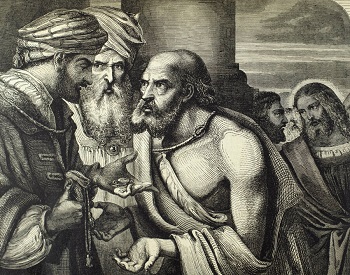
We hear much about the enemies of the Church, the secret societies and the conspiracy to destroy the Catholic Church and everything that in any way resembles Christianity. And yet, who is the real enemy? We are first introduced to our real enemy in the third chapter of Genesis: "Now the serpent was more subtle than any of the beasts of the earth which the Lord God had made. And he said to the woman: Why hath God commanded you, that you should not eat of every tree of paradise? And the woman answered him, saying: Of the fruit of the trees that are in paradise we do eat: But of the fruit of the tree which is in the midst of paradise, God hath commanded us that we should not eat; and that we should not touch it, lest perhaps we die. And the serpent said to the woman: No, you shall not die the death. For God doth know that in what day soever you shall eat thereof, your eyes shall be opened: and you shall be as Gods, knowing good and evil." (Genesis 3:1-5)
Jesus reminds of our true enemy in the Gospels: "And fear ye not them that kill the body, and are not able to kill the soul: but rather fear him that can destroy both soul and body in hell." (Matthew 10:28)
Saint Paul tells the Ephesians (6:12): "For our wrestling is not against flesh and blood; but against principalities and powers, against the rulers of the world of this darkness, against the spirits of wickedness in the high places."
Lucifer and his minions are our real enemy, not people on earth. True Lucifer works through people, who let him work through them. However, these enemies of truth, are to be prayed for, especially for their conversion. Once we are aware of the lies that come from the Father of Lies, we can stay away from them. We should love truth and the Author of truth, Almighty God. We should spend much time in truth. Especially the Sacred Scriptures.
If we have enemies they are actually to be found in our own ranks. Saint Pius V tells us: "All the evils of the world are due to lukewarm Catholics." Saint Bernadette of Lourdes says: "I only fear bad Catholics." When we do not live up to our vocation as Catholics, we become God's worst enemies. We weaken the Church by our laxity and bad example.
We are all called to be saints. The saints are friends of God and the real friends to the world. Yes, we want the world to abandon its maxims and adopt the maxims of the Gospel. We want eternal happiness for all. "Who will have all men to be saved, and to come to the knowledge of the truth." (1 Timothy 2:4)
Let us remember that like charity, reformation begins at home. If we truly want to change the Church and world for the better, let it begin in our own heart and souls. Let us live the Christian way of life by the Gospels. Let us not make any exceptions for ourselves. Let us remember that there are ten commandments not nine and a half. Let us find our pet sin and ask God to help us remove it from our lives. Let us not be The Enemy!
The Funny Pharmacy
A joyful mind maketh age flourishing: a sorrowful spirit drieth up the bones. - Proverbs 17:22
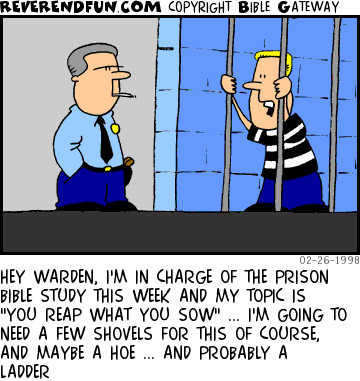
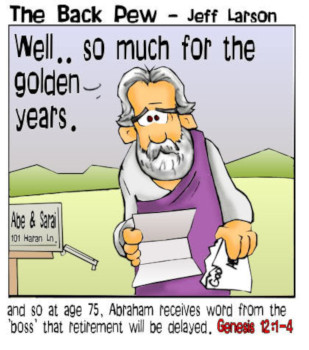



Frequently Asked Questions

Are you of the belief that the Pope, even though not a priest or member of the clergy when elected, must receive Holy Orders after election in order to remain the Pope?
Pope Pius XII addresses this in an address to a Catholic Action group: “If a layman were elected pope, he could accept the election only with the condition of being ready and willing to receive ordination; the capacity to teach and govern, as well as the charism of infallibility, would be granted to him as of the moment of its acceptance, even before his ordination.” If a man refused to be ordained, then some canonists hold that he did not truly accept election, since ordination and consecration are an essential part of the Office of Bishop of Rome.
For answers to more frequently asked questions, click here: https://www.vaticaninexile.com/frequently_asked_questions.php
The Pope Speaks: August 2020
Is It a Sin To Wear a Mask?

Some today are saying we should not obey laws requiring us to wear a mask in public places. In fact, some even recommend rebelling against such laws. The only reason which permits us to disobey a law is a higher law. "But Peter and the apostles answering, said: We ought to obey God, rather than men." (Acts of Apostles 5:29) And so the only thing that permits us to set aside these laws is that it is a sin to wear a mask. Otherwise to disobey a law is also a sin. "Admonish them to be subject to princes and powers, to obey at a word, to be ready to every good work." (Titus 3:1)
"Let every soul be subject to higher powers: for there is no power but from God: and those that are, are ordained of God." (Romans 13:1) Let us remember that ALL authority comes from God, both secular and religious. As such we have a duty to obey in all things except sin. Let us further remember that doubtful cases are to be decided in favor of the superior. We must be certain before we may take any action against a superior. Let us follow the example of Jesus: "Jesus answered: Thou shouldst not have any power against me, unless it were given thee from above. Therefore, he that hath delivered me to thee, hath the greater sin." (John 19:11)
"By me kings reign, and lawgivers decree just things, By me princes rule, and the mighty decree justice." (Proverbs 8:15-16) God has our rulers in His hands. Our best weapon against what we think is unjust or evil authority is prayer. In fact in many cases this is our own weapon. In the United States and other places there may be a legal recourse in some instance, which we may take. For instance in the county in which We live, someone testified before the county commission, which was deciding on what to pass in regard to masks for the county. This person was against wearing masks and voicing her concern to those in authority. This person was taking advantage of this opportunity granted under law.
The problem today is that many are using the wrong forum to voice their concerns. The internet is rife with such rants and raves, when we should be silent. If We had a concern, We would approach those in authority directly and voice Our concerns. Otherwise We encourage obedience to the authorities and prayer.
There are some, who have a legitimate objection to wearing a mask, those with health issues that will be worsened by such a requirement. In the United States this is addressed by the Americans with Disabilities Act, which exempts them from such requirements. Usually orders to wear masks in certain situations repeat such exemptions.
There is a saying, you get the government you deserve. And so if we desire a better government let us pray for one. Prayer is the place to start to improve the world. We cannot talk others into improving, if we ourselves are not working to become saints ourselves.
The most important steps are conversion, repentance and prayer. Repentance includes penance, but goes further to fulfilling the recommendation of Jesus: "Go and sin no more." (John 5:14; 8:11) Unfortunately many today are misinterpreting then as sin no more than I am now, but sin no less. Sin no more means to remove sin from our lives. By ourselves this is impossible, but "with God all things are possible." (Matthew 19:26; Mark 10:27; Luke 18:27) God will help us to overcome sin and remove sin from our lives, if we will ask Him. "Ask and receive that your joy may be full." (John 16:24) The reason we do not sincerely ask God to take our sin from us is that we still want our pet sin(s). Let us then ask God to remove our love for our pet sin(s). Let us acknowledge our weakness and His strength.
You may ask what all of this has to do with face masks? The reason some are rebelling against the use of face masks, when requested, is that deep down that want to do everything their own way. Face masks are a symbol of obedience, and some want to rebel. Let us remember where disobedience began and with whom and his current address. Lucifer said: "I will not serve." Christians are servants by vocation. We serve the secular rulers in all things, except sin. It is not sin to wear a face mask, so when requested, put yours on.


Saint Mark the Ascetic
On The Spiritual Law

11. Do not grow conceited about your interpretations of Scripture, lest your intellect fall victim to blasphemy.
12. Do not attempt to explain something difficult with contentiousness, but in the way which the spiritual law enjoins: with patience, prayer, and unwavering hope.
13. Blind is the man crying out and saying: "Son of David, have mercy on me." (Luke 18:38) He prays with the body alone, and not yet with spiritual knowledge.
14. When the man once blind received his sight and saw the Lord, he acknowledged Him no longer as Son of David but as Son of God, and worshipped Him (cf. John 9; 38).
15. Do not grow conceited if you shed tears when you pray. For it is Christ who has touched your eyes and given you spiritual sight.
16. He who, like the blind man, casts away his garment and draws near to the Lord, becomes His disciple and a preacher of true doctrine (cf. Mark 10:50).
17. To brood on evil makes the heart brazen; but to destroy evil through self-restraint and hope breaks the heart.
18. There is a breaking of the heart which is gentle and makes it deeply penitent, and there is a breaking which is violent and harmful, shattering it completely.
19. Vigils, prayer, and patient acceptance of what comes constitute a breaking that does not harm but benefits the heart, provided we do not destroy the balance between them through excess. He who perseveres in them will be helped in other ways as well; but he who is slack and negligent will suffer intolerably on leaving this life.
20. A self-indulgent heart becomes a prison and chain for the soul when it leaves this life; whereas an assiduous heart is an open door.
Saints from East and West

August 19 - Blessed Emily of Vercelli.
Emily Bicchieri was born at Vercelli in 1238, and having lost her mother at an early age put herself under the special protection of the all-holy Mother of God. She combined a healthy aversion from worldliness with an efficient care for her widowed father's household. Her father, being a good man, planned for her a respectable marriage by which his daughter, himself, and the husband-to-be would all benefit. But when she was sixteen Emily upset all this by telling him she wanted to be a nun. At first Peter Bicchieri would not hear of such a thing, but he was a Christian and reasonable man and at length gave in to his daughter's importunities. He went further, and built and endowed a convent at Vercelli, of which Sister Emily became prioress at the age of twenty. These nuns were under the direction of the Friars Preachers, and according to one of several theories of the origins of third orders, this was the first convent of Dominican regular tertiaries.
Having been elected prioress against her will, Blessed Emily governed with tact and ability, and was careful to tell no one to do what she would not do herself - except that she would never interview the fashionable ladies of Vercelli in the parlour if she could possibly help it. In directing her sisters she laid particular stress on "knowing what you were after" and on the purity of that intention: otherwise, she would say, one is like a person going to market who does not know with whom to deal or what price to pay; and God's glory must be the last end of all their actions and the motive of their religious obedience.
Those were the days, albeit the "ages of faith," when frequent communion was not customary, and Blessed Emily was remarkable in the practice and privilege of receiving the Blessed Sacrament three times a week and on all great feast-days. She was distinguished by a notable spirit of gratitude both to God and man, and by her love for liturgical prayer. She is reputed to have had the gift of miracles and to have stopped by her prayers and the sign of the Cross a disastrous fire in the convent.
Blessed Emily died on her birthday, May 3, at the age of seventy-six. Her cultus was approved in 1769.
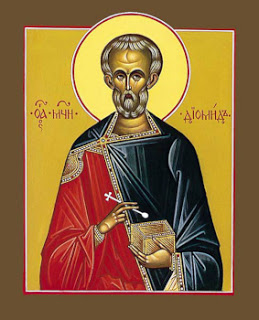
August 16 - Saint Diomede the Martyr.
The Martyr Diomede was born in Cilician Tarsus, and by profession he was a physician, but by belief a Christian, and he treated not only ills not only of body but also of soul. He enlightened many pagans with belief in Christ, and baptised them. The Church venerates him as an healer and summons his name during the making of the Sacrament of Oil-Anointing the Sick.Saint Diomede traveled much, converting people to the true faith. When he arrived in the city of Nicea, the emperor Diocletian (284-305) sent soldiers to arrest him. Along the way from Nicea to Nicomedia, he got down from the cart so as to pray, and he died. As proof of carrying out their orders, the soldiers cut off his head, but became blinded. Diocletian gave orders to take away the head back to the body. When the soldiers fulfilled the order, their sight was restored and they believed in Christ.


Books to feed your faith!
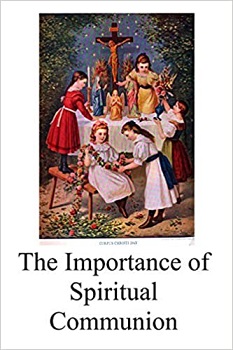
The Importance of Spiritual Communion
Kindle $2.99 / Paperback $5.99
If we cannot receive Holy Communion actually, then let us do so spiritually. These prayers and instructions have been gathered from the Saints and other venerated spiritual writers. Spiritual Communion has been a part of the spiritual life for decades. Growing up I was instructed to make a Spiritual Communion, when I could not go to Communion such as when I assisted at a second Mass. The same is true if one finds oneself at Mass, but not fasting. There are times coming, when it will be difficult, if not impossible to assist at the Holy Sacrifice of the Mass. We should be prepared for such times.
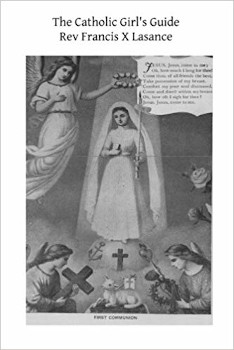
The Catholic Girl's Guide: Counsels and Devotions for Girls in the Ordinary Walks of Life
$17.95
The exhortations or instructions which constitute the principal part of this work were originally conferences which I, in my character of chaplain to a young ladies' Institute, gave to girls between fifteen and twenty years of age. The following are the reasons which led me to place them before the public. In the first place, I felt that the conferences would be of more permanent utility to the girls who heard them, if they could he read by them afterward in print. In the second place; I knew that if these instructions were published, whatever beneficial influence they might have would no longer be restricted to those who were present when they were delivered, since they would become to a greater or less extent the common property of a far wider circle of Catholic girls, in equal need of counsel and instruction. And my third reason was that amongst all the numerous and excellent instructive Manuals and Prayer-Books for Catholic girls there is not, to my knowledge, a single one that treats of the spiritual life of a young girl in so comprehensive and detailed a manner as is done in these pages.
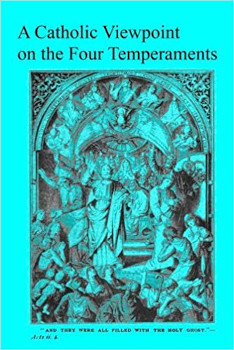
A Catholic Viewpoint on the Four Temperaments
$9.99
This is a compilation of information from several older works, which have been brought together to explain this most important consideration in the spiritual life. We begin with a short consideration from Father Scaramelli, who died in 1752. He wrote a four volume work, Directorium Asceticum, which is an excellent treatise on the spiritual life. He touches on the four temperaments briefly. We will expand with the thoughts of Father John Henry Schagemann CSSR from his work, Manual of Self-Knowledge and Christian Perfection. This work is in two parts the first on the Four Temperaments and the balance is a excellent summary of the spiritual life. The first part of this 1913 work is reproduced here. The balance of this work is inspired by Konrad Hock, who wrote The Four Temperaments. There is a great deal of interest in self-examination in these days and the four temperaments are a great guide to understanding ourselves, our strengths and our weaknesses. Some misuse this information in order to find an excuse for sin, but there is no excuse for sin. Knowing our temperament, we can know where our strengths and weaknesses lie and with the help of God over come our weaknesses and build upon our strengths The four temperaments are based upon the four humors ancient philosophers believed exist in the human body: Melancholy, (Melancholic) Phlegm, (Phlegmatic) Blood (Sanguine), Choler (Choleric or Bilious). We begin with a test to determine our temperament, so we can know where we stand entering into our study.
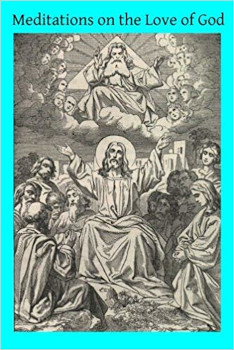
Meditations on the Love of God
$12.95
DIEGO DE ESTELLA, the author of the work from which the following pages have been translated, was born A. D. 1524, at Estella, in the Kingdom of Navarre. In due course he assl.uned the cowl of the Order of S. Francis, as one of the Friars Minor of the Regular Observance, at Salamanca. He was appointed Royal Preacher, Adviser and Theologian to King Philip II., and became Confessor to Cardinal Granvela. To his pen we owe, besides several works in Latin, the following written in Spanish: 1. De la vanidad del mundo; 2. Meditaciones del Amor de Dios; 3. La vida y excelencias de san Juan Evangelista. The first of these works was one of the very few books recommended by Dona Oliva de Sabuco; the second is the subject of the present translation. Diego died at Salamanca, 1st August, 1578, aetat. fifty-four. ALL Thy creatures declare to me, O Lord, that - I should love Thee, and in everyone of them I discover a tongue which proclaims Thy goodness and greatness. The beauty of the heavens, the brightness of the sun and moon, the effulgence of the stars, the splendour of the planets, the currents of the waters, the verdure of the fields, the diversity of flowers, the variety of colours, and all that Thy divine hands have made, O God of my heart and Spouse of my soul, tell me that I should love Thee. Everything that I see invites me to Thy love, and reproaches me when I love Thee not. I cannot open my eyes without beholding preachers of Thy most exalted wisdom! I cannot open my ears without hearing those who proclaim Thy goodness; for everything that Thou hast made tells me, O Lord, what Thou art.
For More Good Traditional Catholic Books:

Simple Summer Gazpacho

INGREDIENTS:
2 pounds ripe roma tomatoes, halved and cored
1 small (1/2 lb) cucumber, peeled and seeded
1 medium green bell pepper, cored
1/2 small red onion, peeled
2 small garlic cloves (or 1 large clove), peeled
3 tablespoons olive oil
2 tablespoons sherry vinegar
1 teaspoon fine sea salt
1/2 teaspoon freshly-cracked black pepper
1/2 teaspoon ground cumin
1 thick slice of good white bread, soaked, crusts removed
optional garnishes: homemade croutons, chopped fresh herbs, a drizzle of olive oil, or any
leftover chopped gazpacho ingredients
DIRECTIONS:
Combine all ingredients together in a blender or food processor. Puree for 1 minute, or until
the soup reaches your desired consistency. Taste and season with extra salt, pepper and/or
cumin if needed.
Refrigerate in a sealed container for 4 hours, or until completely chilled.
Serve cold, topped with your desired garnishes.
Simple Watermelon Sherbet

3 cups seedless watermelon cubes, cut 1 inch in size and frozen solid
1/2 cup vanilla yogurt
DIRECTIONS:
2. Serve immediately for a frozen yogurt/soft-serve consistency. For a firmer consistency, freeze for 1 to 2 hours and then scoop. Leftovers may be frozen solid, but the sherbet will be very hard and impossible to scoop straight out of the freezer. Instead, place the container of frozen sherbet in the refrigerator to slowly soften for 3 hours before serving, at which point it should be scoopable.
Notes
A small (personal-sized) seedless watermelon will yield around 7 cups of watermelon cubes, enough for at least two batches of this recipe. I try to remove as many small seeds as possible while cutting my watermelon into cubes so that the seeds don't end up in the sherbet.
To freeze the watermelon cubes, place them in a single layer on a rimmed baking sheet and place in the freezer for at least 4 hours but preferably overnight. Make sure there's not excess watermelon juice on the pan or the cubes will freeze into a solid mass. I also prefer freezing the cubes on top of a piece of foil or parchment paper which makes it easier to release them from the pan later.
When making this sherbet, be sure to work quickly or the watermelon will start to thaw and the sherbet may become watery.
Video sermons and instructions: Timeless timely truths for living the Faith
The Necessity of Mortification
Assumption 2012
Show Me Your Scars
What are the Ten Commandments?

Encouragement for Today
Therefore encourage one another and build one another up.... I Thessalonians 5:11
We believe...
that through our assorted podcasts, audio downloads and devotional blogs, you will find an assorted Treasure Chest of...
Sermons
Devotionals
Scripture Studies
Catechism Lessons
Daily Blogs
...that will be a help in your faithful walk with the Lord.
LEARN MORE AT THE ENCOURAGEMENT FOR TODAY WEBSITE: https://www.encouragementfortoday.com

Insect Parasites

“And God said: Let the earth bring forth the living creature in its kind, cattle and creeping things, and beasts of the earth, according to their kinds. And it was so done.”
Genesis 1:24
The Fire Ant can be aggressive and deliver dangerous venom, but in the perfect world originally created by God, insects such as this would not be expected to be so troublesome.
Scientists have been studying an insect parasite that may be helpful in controlling troublesome insects. This parasite, itself an insect, is capable of killing even Fire Ants. The parasitic order called Strepsiptera consists of over 500 species. They are known to prey on insects in 34 different families. In its larval stage, it seeks out a victim. When it finds one, it burrows through its hard outer layer to the first layer of cells. Here, it hijacks the insect’s immune system, which rather than attacking it, encloses it in a layer of skin. Males of one species of the parasite attack ants while the females attack grasshoppers. Another species, which attacks a species of katydid in New Guinea, has no males at all. Once they mature inside their host, they poke the top of their body out of the skin bag and release some 800,000 larvae. The new generation sets out to find more hosts, and the host dies.
Scientists are studying these insect parasites in the hope of learning how to use them to control troublesome insects. In doing so, they are following God’s command given in Genesis for man to subdue the Earth.
Catechism Catch-Up
The Fourth Commandment: Honor Your Father And Your Mother- Lesson 9

It is a commandment of God. It is a commandment with promise, with divine blessings attached to it. It is a commandment positioned in a place of special honor and significance. It is a commandment pertaining to the whole life of every human being. It is a commandment with application to the home, to the Church, and workplace, a commandment that provides a stable foundation to all of society. Yet it is a commandment that is sorely neglected today. It is the fourth of God’s ten great commandments to humanity: “Honor your father and mother.”
What does it mean to obey this commandment as adults? We understand that it applies to children and teaches them the importance of honoring and obeying mom and dad. But does the commandment stop applying the day we move out or the day we get married? Does it expire when our parents die or when they prove themselves unworthy of our respect? Does it apply to those who have been abandoned or abused? Does our adherence to this commandment change as we grow older and become independent? Maybe our questions are urgent and practical: What are my obligations toward my parents? Do I need to support them financially? Do I need to obey them even though I’m a full-grown adult? These are some of the questions we need to ask and answer if we wish to honor God by honoring his commandment.
Our key verse will be Deuteronomy 5:16: “Honour thy father and mother, as the Lord thy God hath commanded thee, that thou mayst live a long time, and it may be well with thee in the land, which the Lord thy God will give thee.” That verse will springboard us to other locations in the Old Testament: Exodus, where we will discover the terrible consequences of disobeying God’s commandment, and to Proverbs where we will marvel at God’s promises of blessing to those who take his law seriously. And, of course, we will go to the New Testament, to the life of Jesus to see how he both taught and modeled the way to honor parents, and then to Paul’s letters where we will see how ancient commands apply to us as Catholics today.
Three Reasons to Know and Obey This Commandment
We Are All Children. It is the most basic biology:
Every human being is the offspring of two other human beings. Some of us have always known and respected both of our parents. Some of us have only ever known one of our parents or have only ever known adoptive parents. Some even grew up apart from parents in foster care. Some of us have outlived our parents. Regardless, the fourth commandment applies to each of us for the simplest of reasons: We are all children. There is no human being outside of its scope because there is no parent-less person.
Of course, we also know that God’s commandments are to be taken both literally and principally. The commandment’s stipulations go beyond the simple relationship of children to parents and extend to all other positions of authority and submission.
The fourth commandment “refers primarily to our natural fathers, yet the name belongs to others also, and these seem to be indicated in the Commandment, as we can easily gather from numerous passages of Scripture. Besides our natural fathers, then, there are others who in Scripture are called fathers,....and to each of these proper honor is due.”-Catechism of the Council of Trent
“In the first place, the prelates of the Church, her pastors and priests are called fathers” (I Corinthians 4:14-16).....those who govern the State, to whom are entrusted power, magistracy, or command, are also called fathers; (II Kings 13:14; DRBV IV Kings). The name father is also applied to those to whose care, fidelity, probity and wisdom others are committed, such as teachers, instructors, masters and guardians; (II Kings 2:12, 13:14; DRBV IV Kings). Finally, aged men, advanced in years, we also call fathers.”-Catechism of the Council of Trent
The right ordering of family government, church government, and civil government all depend on this commandment. In this way, too, it is universal. We are all children, we are all under authority, so we all need to hear and heed it.
This Commandment Comes With Promise.
Our second reason is that this commandment comes with promise. It is wise and good to obey the commandment so we can enjoy the promised blessings. Conversely, it is daft and dangerous to disobey the commandment and forfeit the promised blessings. When Paul writes to the children in Ephesus he reminds them of God’s promise for their obedience: “Children, obey your parents in the Lord, for this is just. Honour thy father and thy mother, which is the first commandment with a promise: That it may be well with thee, and thou mayest be long lived upon earth.” (Ephesians 6:1-3). God promises a long life and a good life to those who obey this command. It pleases God when we obey, so naturally he dispenses his blessings to us (Colossians 3:20).
The promise, “the reward is great, indeed, for it consists principally in length of days. They who always preserve the grateful remembrance of a benefit deserve to be blessed with its prolonged enjoyment” It includes the “life we live here on earth” as well as “the eternal life of the blessed.”- Catechism of the Council of Trent
There is no obedience or love to God without obedience and love toward parents.
God Gives This Commandment a Place of Special Honor.
Now we add a third reason to understand and obey this commandment: God gives it a place of special honor. The Church has long divided the ten commandments into two groups or two tables.
“The divine precepts of the Decalogue were written on two tables, one of which, on the opinion of the holy fathers, contained the three preceding, while the rest were given on the second table. This order of the Commandments is especially appropriate, since the very collocation points out to us their difference in nature. For whatever is commanded or prohibited in Scripture by the divine law springs from one of two principles, the love of God or of our neighbor...” -Catechism of the Council of Trent
As the Catechism says, the first group explains our duty toward God and the second explains our duty toward our fellow men. This commandment falls squarely between the two and in that way reminds us that our parents have a unique role in our lives. Our parents are God’s divine representatives to us so that when we honor and obey our parents we honor and obey God. There is no obedience or love to God without obedience and love toward parents.
If we remove this commandment, we have undermined all ten.
We have fallen into serious, dangerous disobedience.
We are all children, we ought to pursue God’s blessings, and we need to give prominence to God’s prominent command. For these reasons and many others we can not ignore this commandment.
A Word of Warning
Before we conclude, I would like to offer a word of warning. There is something deep within us that hears a commandment and immediately searches for the exception clause. “But you don’t know my parents.” “But I don’t know my parents.” “But my parents disowned me.” “But my parents were abusive.” We will deal with exceptions, we will see that honor takes different forms and adapts to different situations. But we must deal with the principle before we deal with the exceptions. We will discuss what to do in situations where there has been abuse or where there has been an especially contentious relationship. I don’t mean to excuse or downplay horrific experiences. But before we can do anything else we need to understand and admit this: There is no “if” attached to the fourth commandment. We must honor our parents. There are no exceptions.
Wrapping Up
In the next lesson we will explore honor and obedience as the basic ways we comply with the fourth commandment. We will consider the role of the parent in being worthy of honor and then turn to hard cases like neglect, abuse, and abandonment—cases where honor is difficult or obedience would be sinful. Finally, we will look at very practical ways we can all honor God by honoring our parents.
READ MORE FROM THE TRADITIONAL CATECHISM AT THE WEBSITE: https://www.traditionalcatechism.com
Living Catholic:
Does it matter how I respond to an offender?

Responding to Offenders: You can make a difference through forgiveness
When someone offends you, your response can lead to the bondage of bitterness or the freedom of forgiveness. You might be surprised by the far-reaching results of your attitudes and actions!
A Proud Response Leads to Bitterness
This sequence describes a bitter response to an offense:
-
Someone offends you.
-
You react with resentment.
-
A barrier to further communication comes between you.
-
Others sense your bitterness, and your offender tells his friends about your resentment.
-
Your friends join you in resenting your offender, and his friends join him in reacting to you.
-
Barriers and bitterness infect your community as others take up the offenses.
A Humble Response Leads to Forgiveness
This sequence describes a positive response to an offense:
-
Someone offends you then asks for forgiveness.
-
By God’s grace, you respond with forgiveness.
-
This response strengthens your character and offers hope and healing to your offender.
-
Your offender tells his friends about your forgiveness.
-
You have opportunities to build new friendships and share the Gospel.
-
Lasting friendships bring joy and fulfillment.
An offense is a humbling situation. In that initial moment of humility, God offers the grace to respond with forgiveness. “But God giveth greater grace. Wherefore he saith: God resisteth the proud, and giveth grace to the humble.” (James 4:6). By receiving God’s grace, you can turn away from the pride that rises up to react and take up an offense. A God-honoring response of humility and forgiveness will bring healing and health to yourself and your community.
“Let all bitterness, and anger, and indignation, and clamour, and blasphemy, be put away from you, with all malice. And be ye kind one to another; merciful, forgiving one another, even as God hath forgiven you in Christ. Be ye therefore followers of God, as most dear children; And walk in love, as Christ also hath loved us, and hath delivered himself for us, an oblation and a sacrifice to God for an odour of sweetness.” (Ephesians 4:31–5:2).
To Learn More Principles For Life Go To: Resources: Principles of Life


Pray for the Holy Father! Pray with the Holy Father!
- Your prayers are asked this month and every month for the intentions of the Holy Father, Pope Michael.
- Please pray for one of our regular contributors and authors whose computer has just died. May he be back online soon!
- Pray especially that Holy Ghost inspires and helps us prepare spiritual manuals and days of recollection to make available to all.
- Keep in your prayers our Podcast Ministry, a new way to reach out in the missionary work of the Church! We ask for prayers for our other activities world wide. We have made good contacts in the Philippines and Japan and ask prayers that these contacts will bear much fruit for the salvation of souls.
- Be sure to keep St. Helen Catholic Mission in your prayers. Why not go on over to the site now and see what they have to offer and how you might be able to help!
- Also we ask you to keep in prayer our increasing missionary work in the United States and elsewhere.
- Your prayers are asked for Father Francis Dominic as he continues the new work in Kissimmee Florida that has been entrusted to him within the Church.
- Pray for those outside the Church and those who do not know God, that they may see the light of grace and be led safely home to the refuge of the Holy Catholic Church.
- As always, we also ask that you pray for yourself! Never forget your own state of soul. God is calling you to His service in His love. We know that our Lord can count on you to answer.
- We are all praying especially for you, too. May you correspond with every grace of God!
- In what other needs or intentions may we pray for you? Let us know!
- Let us remember that the Church runs on prayer. Without your prayers, God will not work in hearts and souls to bring them to a knowledge of the truth. (I Timothy 2:4)


To Donate online go to:

To Donate by Mail:
Our address is
Vatican in Exile
829 NE Chester
Topeka, Kansas 66616
Make Checks payable to:
Vatican in Exile









 Follow
Follow


